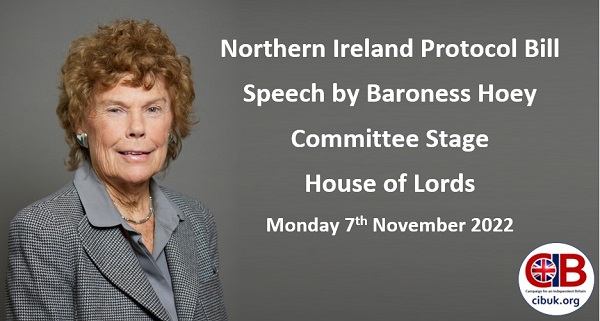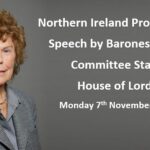Northern Ireland Protocol Bill – Speech by Baroness Hoey

Northern Ireland Protocol Bill Speech by Baroness Hoey
Committee Stage
House of Lords
Monday 7th November 2022
INTRODUCTION
On behalf of CIBUK.org we are pleased to promote the following speech by Baroness Hoey on the Northern Ireland Protocol Bill in which she makes an impassioned constitutional plea on behalf of the people of Northern Ireland.
No one is better versed in the history and detail of Northern Ireland politics than the noble Baroness and we quote her extensively from her speech to the House of Lords in the article below.
PROPOSED AMENDMENT
Clause 22 is one of the most significant in the Bill and sets out the general scope and nature of the powers available to ministers.
Lady Hoey’s proposed amendment seeks to prevent a Minister of the Crown making provision by regulation which has the effect of repealing, subordinating or otherwise interfering with the United Kingdom’s foundational constitutional statutory framework.
In her own words “This amendment is very simple. It seeks to remedy an important gap at the heart of the Bill.”
The amendment she seeks in Clause 22 is to insert the words “, but may not amend, repeal, or create an incompatibility with, the Act of Union (Ireland) 1800 or the Union with Ireland Act 1800.”
ACT OF UNION UNDER THREAT
Fears that present arrangements could endanger the present constitutional status of Northern Ireland appear well founded. According to Lady Hoey
“The Prime Minister before the previous Prime Minister, speaking in the House of Commons, claimed that the withdrawal Act was not intended to affect the Acts of Union, yet a few months later senior counsel, on behalf of the then Government, went to court in our protocol case in Belfast and argued exactly the opposite.”
Nor historically, she argues, has subordinate legislation ever challenged the integrity of the Acts of Union:
“There has been some commentary suggesting that the Acts of Union were somehow repealed or overridden by the Government of Ireland Act 1920 or later statutory provisions, but that is simply not so.
The 1920 Act simply made provision for separate devolved arrangements in two parts of Ireland, each of which remained fully part of the United Kingdom and subject to the United Kingdom Parliament. There was and is nothing in the Acts of Union to prevent the creation of subordinate legislatures, provided that the King in Parliament remains sovereign.”
PROTOCOL MUST YIELD TO ACT OF UNION
Where a conflict between the Protocol and the Act of Union arises, Baroness Hoey is emphatic about which needs to give way:
“While this Bill may well conflict with international obligations under the protocol, any such obligations must yield because the protocol subjugates the fundamental constitutional foundation of the United Kingdom.
FLAWS IN CURRENT BILL
If the Bill were to stand in its present form, she argues, the dangers are obvious:
“The bill as it currently stands has a hole in it. it does not prevent a Minister of a Crown using the Henry VIII powers that we have heard so much about to replace the current arrangements with new arrangements that would again breach the Acts of Union.
LOGICAL ABSURDITY
As things currently stand, a Minister of the Crown is prohibited from doing anything to facilitate or create a land border where it should be but remains free to do so within the UK itself thereby subjugating the Acts of Union.
“That simply is an absurdity. I know that the Minister could not really give a reason why this had not gone in but I trust—being very naive, perhaps—that it was simply an oversight on the part of the drafters.
“Let us be clear: the restoration means an end of EU law applying in Northern Ireland. If it continues to apply in Northern Ireland but not in the rest of the United Kingdom then the Acts of Union are breached.”
BRUSSELS & DUBLIN
In her concluding remarks, Baroness Hoey exposed one final, glaring anomaly.
“Last week, after a lot of procrastination, the Northern Ireland Office ruled out law-making powers over Northern Ireland for Dublin. It did so correctly, on the basis that this would breach the principle of consent.
Can the Government therefore explain how they reconcile the plainly correct position that law-making powers being handed to Dublin would breach the principle of consent with their continued entirely illogical claim that handing law-making and judicial powers to Brussels does not?
What, tell me, is the difference between Brussels exercising law-making powers over Northern Ireland and Dublin doing the same? In truth, I do not think that there is any coherent answer to that.”
CONCLUSION
The noble Baroness’s concluding observations are clear and unambiguous:
- Amending Clause 22 would provide some constitutional safeguard against the obvious loop-holes which currently exist.
- There can be no power sharing in Northern Ireland unless Unionists are treated with the same respect as Nationalists.
- Either those rights are respected or there will be no power sharing.
“There can be no compromise on that fundamental issue.”
We are indeed grateful to Baroness Hoey for providing our readers with a powerful insight on the present impasse over the Northern Ireland Protocol.
At CIBUK.org, we will do our best to impress those in government to abide by the recommendations which she raises.
A copy of the full speech can be found here.




